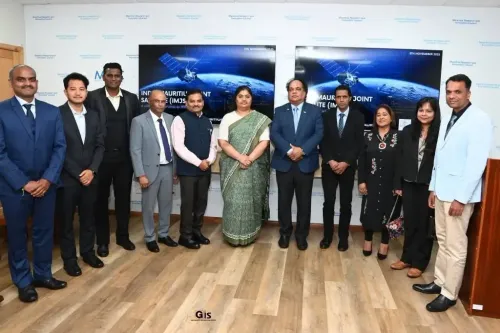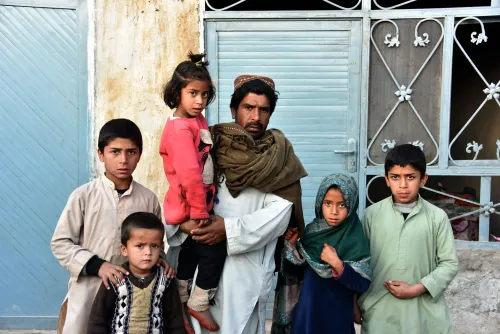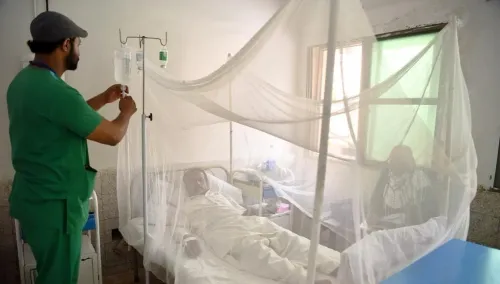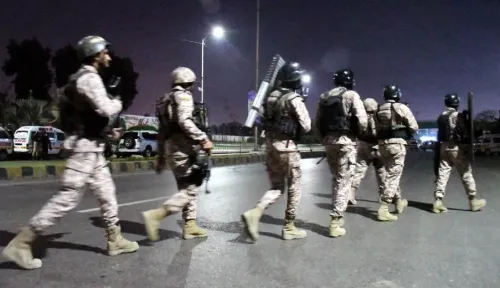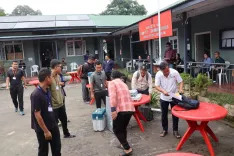A Call for Withdrawal: Pakistan's Struggle Against Balochistan
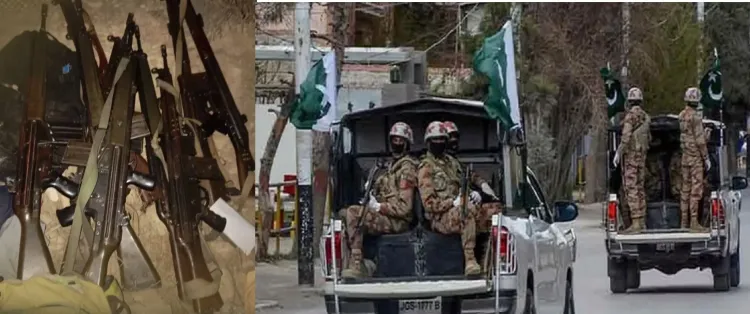
Synopsis
Key Takeaways
- Pakistan's military oppression in Balochistan undermines international law.
- International pressure is crucial for Balochistan’s independence.
- The Balochistan Liberation Charter outlines aspirations for a democratic state.
- Global cooperation can facilitate a peaceful resolution.
- Accountability for war crimes is essential for justice.
Quetta: The United States, demonstrating strategic insight, recognized after two decades of conflict in Afghanistan that achieving success was unattainable. It reflected on the Vietnam War's atrocities and the Soviet Union's downfall in Afghanistan, ultimately deciding that continued involvement would only squander resources and time.
Over the last 30 years, Baloch nationalist leaders have tirelessly worked to inform the United States, NATO, and other Western allies that while their adversaries operated in Afghanistan, their origins were deeply rooted within Pakistan, particularly at the GHQ.
Despite extensive bombardments in the mountainous regions of Tora Bora and deploying the 'Mother of All Bombs', the US failed to realize its objectives. Concurrently, the Pakistani military and ISI, branded globally as mercenaries, misled several US administrations — under George W. Bush, Barack Obama, and Joe Biden — extracting billions while covertly aiding anti-American factions like Al-Qaeda and the Taliban.
Pakistan has adeptly utilized the military assistance received from the US to stifle the Baloch independence movement. Evidence indicates that the Pakistani Air Force employed phosphorus and cluster bombs, along with US-made missiles and explosives against pro-independence Baloch civilians. This raises significant accountability questions for the United States — why was military aid, ostensibly intended for counterterrorism, permitted to target a legitimate Baloch-led liberation movement?
Balochistan and Pakistan represent two separate entities. Pakistan boasts jets, tanks, artillery, and military power, while Balochistan lacks comparable military capabilities. This power disparity enables Pakistan's military oppression and occupation of Balochistan. For over seventy years, Pakistan has violated international war protocols and the UN Charter, brutally using aerial force to quash the legitimate Baloch independence movement.
Despite this ongoing conflict lasting seven decades, the international community has not taken decisive action. The global community must apply diplomatic, military, and economic pressure on Pakistan to relinquish its unlawful control over Balochistan and acknowledge its independence. Such a recognition would empower Balochistan — rich in natural resources — to contribute to regional peace and stability through cooperation with serious stakeholders.
If Pakistan remains resolute in its occupation, regional powers should contemplate extending military aid to Baloch freedom fighters, including anti-aircraft missiles, artillery, and tanks to counter Pakistan's military actions in Balochistan. Enhancing the military capabilities of Baloch independence forces is not aimed at escalating violence but rather restoring balance and averting a humanitarian crisis. Should Balochistan attain military parity with Pakistan, it could significantly hinder Pakistan's ability — especially with China's support — to exploit Baloch resources for financing proxy groups in India, Afghanistan, and other regional states. Hence, an independent, secular, and democratic Balochistan would align with the interests of India, Afghanistan, the Middle East, and Europe.
Even pro-Pakistan political factions and civil society groups are now candidly acknowledging the failures of the Pakistani military. They have recognized the Baloch nationalist perspective, which has consistently claimed that Pakistan has lost the war it initiated against the Baloch populace. A clear indicator of this is the reaction of the local Baloch community — when Baloch freedom fighters target Pakistani military installations, police stations, and checkpoints, the local populace emerges from their residences and rooftops to cheer for the Baloch fighters. This moment reflects utter disgrace for Pakistan — having lost the war morally, politically, religiously, and militarily, it continues to sacrifice its troops in Balochistan.
Pakistani soldiers stationed in military bases in Balochistan are not there to confront the Baloch resistance; they remain deployed solely for their monthly salaries.
This is a pivotal moment for the people of Punjab and its educated populace. If they wish to avoid a humiliation reminiscent of the defeat in Dhaka in 1971, they must urge their military to withdraw from Balochistan. The Pakistani military should transfer all its weaponry, artillery, fighter jets, and war supplies — acquired through Balochistan’s resources — to the Baloch national forces. This would facilitate a peaceful exit strategy for Pakistan’s military from Balochistan.
The withdrawal of the Pakistani military from Balochistan must not mirror the chaotic precedent of the US withdrawal from Afghanistan on August 15, 2021. Instead, prior to the exit of Pakistani forces, a comprehensive international conference should be convened, uniting the political and military leadership of both Balochistan and Pakistan. International entities, including the United Nations, Afghanistan, India, the Organisation of Islamic Cooperation (OIC), European nations, the United Kingdom, the United States, and Asian countries, should be invited as mediators.
Balochistan holds significant geopolitical and economic relevance, serving as a key to regional peace, interfaith harmony, and sustained economic collaboration among nations. To ensure a safe and organized exit, United Nations peacekeeping forces, in collaboration with Baloch pro-independence forces, must first stabilize the security landscape in Balochistan, ensuring a safe retreat for the departing Pakistani military.
Following this, a UN-led peace initiative, with global financial support, should provide military training to Baloch pro-independence forces. The weaponry, artillery, warplanes, and military equipment left behind by the Pakistani army should be allocated to Baloch forces to bolster their capabilities. Joint efforts between Baloch forces and international counterterrorism specialists should focus on eradicating terrorism from the region.
To gain international recognition, Baloch embassies should be established, with Baloch representatives officially recognized as ambassadors. A framework for comprehensive international agreements should be drafted to promote bilateral and multilateral relations globally. Furthermore, Balochistan should be designated as an international trade hub, with economic initiatives launched under the guidance of global financial experts, marking the commencement of nation-building efforts in newly independent Balochistan.
During this global conference, an official request should be made to Pakistan for data and records concerning all Baloch individuals abducted and killed by the Pakistani military. Pakistan must be held accountable for providing detailed information on all Baloch prisoners currently detained in its torture facilities and secret detention centers. The keys to these prisons must be handed over to Baloch pro-independence forces and UN peacekeepers to ensure an immediate release of all Baloch prisoners of war.
Upon their release, these former prisoners must receive urgent medical treatment under the supervision of internationally trained medical professionals. The International Court of Justice (ICJ) should be formally notified of the torture, state oppression, and inhumane treatment inflicted upon these detainees. Independent observers, international human rights organizations, and medical experts must conduct interviews with these individuals to document their experiences of abuse and persecution.
After gathering substantial evidence, all Pakistani military generals and officers implicated in these war crimes should face immediate trials at the International Criminal Court (ICC).
The Pakistani military’s atrocities in Balochistan must be addressed internationally, much like how other dictators and war criminals have been held accountable: Slobodan Milosevic (Serbia, 1999–2006): Tried at the International Criminal Tribunal for the former Yugoslavia (ICTY) for war crimes and human rights violations in Yugoslavia. He was sentenced to death in 2006; Charles Taylor (Liberia, 2003–2012): Found guilty of war crimes and human rights violations during the Sierra Leone civil war. He was sentenced to 50 years in prison in 2012; Slobodan Praljak (Bosnia, 2004–2017): Tried and sentenced to 20 years in prison for war crimes in Bosnia. During his appeal in 2017, he committed suicide in court; Saddam Hussein (Iraq, 2005–2006): Convicted of genocide, mass executions, and the use of chemical weapons against 148 Kurds in Dujail. He was sentenced to death in 2006, which was executed on December 30, 2006; Radovan Karadzic (Serbia, 2008–2019): Found guilty of genocide and war crimes in Bosnia and sentenced to 40 years in prison in 2016, later heightened to a life sentence in 2019; Rodrigo Duterte (Philippines, ongoing): Facing trial at the ICC for war crimes related to extrajudicial killings in his anti-drug campaign.
Despite Pakistan's history of committing genocide in 1971, where three million Bengalis were slaughtered and 200,000 Bengali women were raped, it has never faced international accountability. Now, as Pakistan continues its military occupation of Balochistan, perpetrating severe human rights violations and war crimes for over seven decades, it is crucial that Pakistan’s military generals and officials are brought before the International Court of Justice and the International Criminal Court.
Just as other war criminals and oppressive regimes have been prosecuted, the Pakistani state must be held accountable for its crimes in Balochistan.
All officers, soldiers, and officials of the occupying Pakistani forces found guilty of Baloch genocide, abductions for ransom, arson, leading military operations, and war crimes should not be permitted to exit Balochistan until they have fully served their respective sentences.
Additionally, a thorough economic report must be compiled outlining the extent of Balochistan's plundered mineral wealth that has been exploited for Pakistan’s economy over the past 70 years. A financial investigation should be conducted into the assets of all ranks of the Pakistani military, from junior officers to the Army Chief, as well as all ISI officers stationed in occupied Balochistan. Their bank statements must be scrutinized, comparing their financial status at the time of employment to their current wealth. If any individual has amassed unjustifiable wealth, they should be questioned regarding the sources of their income.
A fact-finding mission should be initiated under the supervision of the United Nations (UN), the International Monetary Fund (IMF), and international financial experts to investigate black money laundered abroad by Pakistani military generals and officers. Any illicit wealth discovered in their accounts or businesses should be confiscated and redirected to the Balochistan Bank as reparations for the economic exploitation of Balochistan.
The Baloch pro-independence political leadership has already crafted a roadmap and blueprint for Balochistan's future, formally documented as the Balochistan Liberation Charter (BLC). This national document embodies the collective aspirations and contributions of every Baloch individual. Under the leadership of Baloch nationalist figure Hyrbyair Marri, the BLC has been translated into 11 languages, including Balochi, Brahui, English, Urdu, Pashto, Arabic, Persian, Hindi, Marathi, Gujarati, and Punjabi.
The Balochistan Liberation Charter envisions an independent, democratic, and secular state, where a one-person, one-vote system will ensure democratic governance. The provisional constitution guarantees equal rights for men and women, and full religious freedom will be upheld within a united and independent Balochistan. The BLC presents Balochistan as a progressive, peaceful, and prosperous nation on the global stage.
The international community, including India, has a golden opportunity to contribute to securing the independence of Balochistan, one of the world's most resource-rich regions. A democratic and secular Balochistan presents unparalleled opportunities for regional peace, security, trade, counterterrorism efforts, drug prevention, employment generation, climate change mitigation, and the eradication of extremism and proxy warfare propagated by Pakistan.
An independent and united Balochistan would not only hold strategic significance in land and airspace dynamics but also possess maritime corridors of global importance. Recognizing Balochistan's independence would establish it as a key global player, ensuring peace and economic stability in South Asia, the Middle East, and beyond.
(The writer is a human rights defender and freelance journalist. He can be reached on X @SobdarBaloch_ Views expressed are personal)

